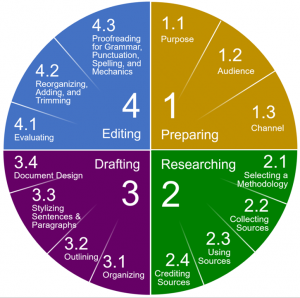Chapter 3: The Writing Process II: Researching
Researching means investigating a problem to acquire new information about it. You can research to clear up your basic understanding of the situation, to establish key facts, or even to help you ask better questions so that you can move forward.
Research is not limited to any one step in the problem-solving process. In some cases, you might need new information as early as the first step of FACED! Sometimes you have a general sense that a problem needs solving, but you might need extra information to help you focus your attention, eliminate distractions, and truly “Find the problem.”
Research can also help you “Ask ‘what’s at stake?’.” Not all problems are equal, and sometimes we have trouble caring about a problem. Other times we might have trouble understanding why someone is upset or how they’re affected by a situation. Finding out more information can help motivate you and make sure that your communication solution does what’s appropriate in a situation.
Before taking action with a plan, you probably need research to “Consider your options and resources.” See what choices are available. A simple example of this is trying to organize dinner plans with friends. You might need to research menus, locations, and pricing before offering up options to the group.
When it’s time to choose the best way forward, you might rely on that information to “Evaluate solutions.” This is the best way to ensure that you’ve done your due diligence. Researching this way will get you a reputation for being resourceful and responsible. All of this research will elevate the quality of your work when you finally “Draft and deliver a solution.”
A word of warning about research: with the emergence of ChatGPT and other Artificial Intelligence (AI) tools, it can be tempting to simply ask AI to do your research for you. Be careful! These tools have their uses, but they are developing technologies that can produce unreliable results. The information they retrieve might be incomplete, out of date, or just plain inaccurate. ChatGPT, for instance, is prone to “hallucinations.” This means that the technology conjures up information and explanations and presents them as factual, even though they have no basis whatsoever in reality. Even when the information it retrieves is correct, ChatGPT is restricted from accessing any information in the current year, or even two years before. That means that it is not a reliable research source.
As this section will show, being an effective researcher is about asking careful questions, choosing credible sources for the answers, and giving full acknowledgement in the assigned reference style (ex. APA).
Figure 3: The four-stage writing process. Section 2 (the green section) shows a breakdown of the following chapters.


